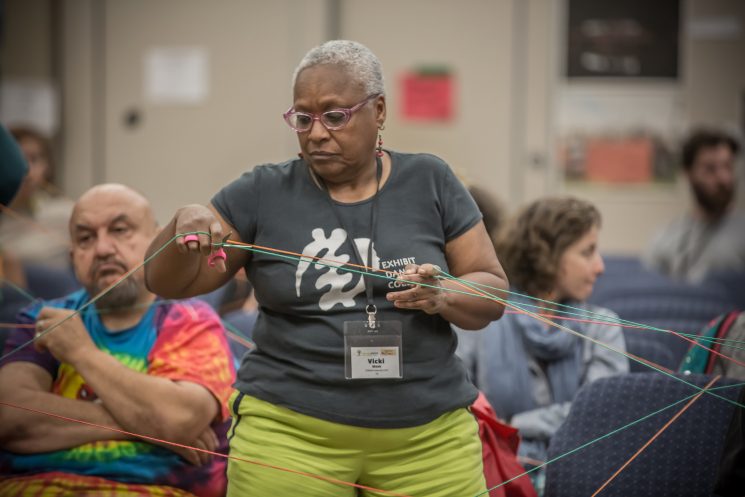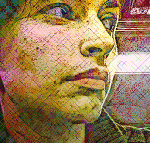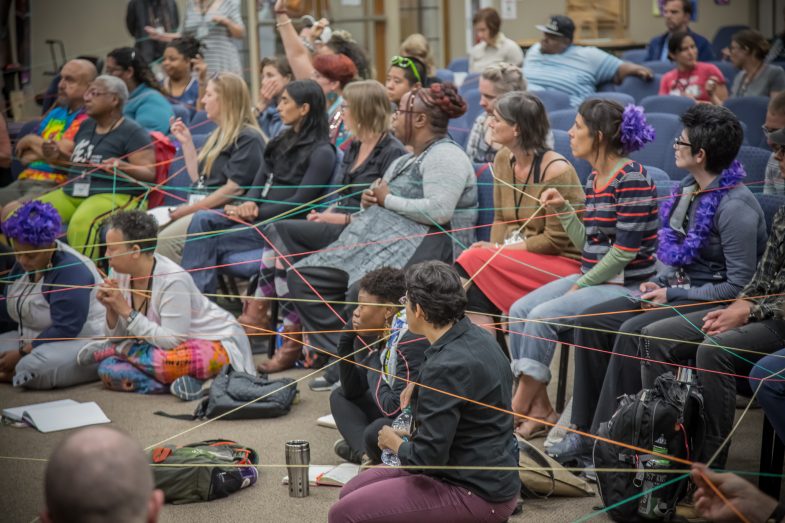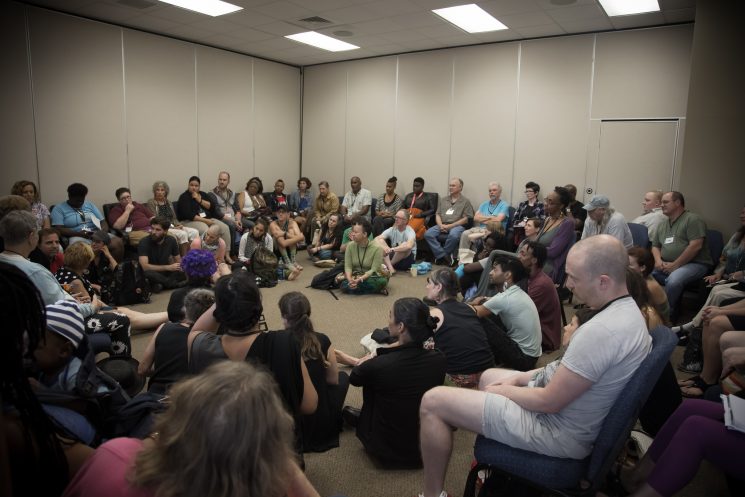UpROOTing Racism & Undoing Oppressions Training at ROOTS Week 2017. Photo: Melisa Cardona.
Rasha Abdulhadi | October 31, 2017
Alternate ROOTS’ practices recognize that we bring the world with us when we gather, whether in working in our home communities or when we gather for our annual meeting. With that comes everything we’re all still working on: in ourselves, in our art, and in our communities. In August, Keryl McCord and Ashley Walden Davis welcomed ROOTS Week attendees to continue the journey to transform Alternate ROOTS from the inside out through UpROOTing Oppression sessions facilitated by ROOTS members. Though this was a change from recent years when outside facilitators were contracted to lead sessions at ROOTS Week, it was also a return to honoring the work that ROOTS members have been leading in community for decades. With the long legacy of an organization like ROOTS, old practices can be made new again, and new practices can draw on long memories.
Here’s the recap:
Over the course of the week, ROOTS Week attendees could join opening and closing sessions of the UpROOTing Oppressions series as well as choose one of two tracks (Green or Blue) to dig deeper depending on where they thought they were in their work. A team of eleven ROOTS members served as co-facilitators for large group presentations and conversation and used small group work and performance as part of these sessions. In the closing session of the track, folks who had attended either group participated in a Critical Response Process to reflect on how the sessions went.
Recognizing that Moments of Heat Can Also Be Moments of Light
The work to uproot oppressions and nurture liberations – plural on purpose, because we need more than just one kind of work – calls us to practice transformation and accountability as well as caregiving and healing. We do ourselves a disservice if we do not recognize these two different calls and balance the ways we honor both modes. I want to invite all ROOTS Week attendees and ROOTS members: let’s offer compassion to ourselves and each other. When we say we’re ready to do this work, we should expect that we’re going to hear the hard stories. We can reasonably expect that this work will challenge us in ways that are beyond our even best facilitation and healing team plans. That is not a sign of our failure – it is a sign that we are touching the work we say we want to do.
In the closing session of the UpROOTing Oppressions track, facilitators and members identified five moments of heat that deserve more attention from our community as we move forward in deeper work. Trans* and gender non-conforming folks called on our community to understand the history of practices like naming pronouns and the purposes served by taking those practices seriously. Our community was asked to attend to the ways in which members of our community live and work at the intersection of multiple oppressions. Our gathering was asked to remember that the violence of oppression exists at both the individual and system level and that our work must attend to the interactions between those levels. As a membership body, we were called on to do this work internally, and as an organization advocating for equity in the arts, we are called on to do this work externally on national and international stages. As a body of people who live in the aftermath and ongoing reality of settler colonialism, we were called to be present for First Peoples’ conversations – not just as token greeting, but as an integrated part of our community building, our workshops, our meetings, and our practices. These moments of heat are also moments of light: they show us how our work can grow as we deepen our commitment to cultivating liberatory practices.

Vicki Meek cuts the thread during an UpROOTing Racism & Undoing Oppressions Session. Photo: Melisa Cardona.
Other moments of heat come up in sessions, in small groups, and in workshops and performances. As we cultivate our field of work, we have the opportunity to build new practices and spaces to use heat and light to fuel growth. One of the advantages of leading from within our membership is that we can grow this process over time, guided by and growing from organizational memory and member development. We have the opportunity to get better through iteration, knowing that our facilitation teams can provide continuity in process while also drawing on the wide range of skills among all our members. When we support our members to lead from within, we develop ourselves as a community and support our members in flexing their own leadership powers. That is itself a liberatory practice.
Cultivating the Field Beyond the Sessions
As we recognize the work within our UpROOTing Oppressions series, I also want to name the web of practices and responses that support this work beyond sessions. The blossoming practice of a Health and Wellness team with co-captains is an example of trusting leadership among ourselves and sharing responsibilities horizontally. The Healing Space in Thornburg’s lounge offered respite for recharging and rehydration, anchored by two visual-artist members and lovingly nourished by offerings of tinctures, tarot cards, art supplies, music, exercise/massage gear, and libations from visitors all week. Creating intentional community agreements and conversations to both foster a Culture of Consent and recognize Sexual and Gender Diversity are both parts of defining and tilling a field for the work we are doing. I am grateful to the broad, luscious membership of ROOTS for embodying multiple modes and modalities of addressing this deep work at the level of individual, community, and system.
Many organizations call in outside consultants to support cultural transformation, and there are times when bringing in an outside facilitator makes it possible for groups to pay attention to entrenched cultural difficulties. There may even be a time when ROOTS decides again that we want to draw on knowledge beyond ROOTS’ membership. But given the diversity of ROOTS membership, the depth of experience of our members, and the skills being brought into ROOTS as we grow our membership, I am excited about the work we can do together and the ways we continue to learn from each other and with each other.
…..
 Rasha Abdulhadi is a Palestinian Southerner who grew up between Damascus and rural Georgia and cut her teeth organizing on the southsides of Chicago and Atlanta. She is a 2017 Poetry Foundation Incubator Fellow and 2017 Maryland State Arts Fellow in Poetry, as well as a member of the Radius of Arab American Writers and Alternate ROOTS. Her writing has appeared in Mslexia, Mizna, Room, |tap| magazine, and at sinnerscreek.com. She is a contributor to Luminescent Threads: Connections to Octavia Butler. Her first chapbook, Shell Houses, is available from The Head & The Hand Press.
Rasha Abdulhadi is a Palestinian Southerner who grew up between Damascus and rural Georgia and cut her teeth organizing on the southsides of Chicago and Atlanta. She is a 2017 Poetry Foundation Incubator Fellow and 2017 Maryland State Arts Fellow in Poetry, as well as a member of the Radius of Arab American Writers and Alternate ROOTS. Her writing has appeared in Mslexia, Mizna, Room, |tap| magazine, and at sinnerscreek.com. She is a contributor to Luminescent Threads: Connections to Octavia Butler. Her first chapbook, Shell Houses, is available from The Head & The Hand Press.


